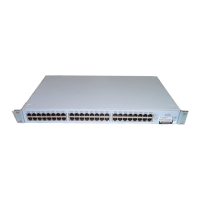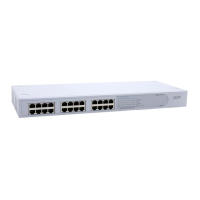560 CHAPTER 42: IGMP SNOOPING CONFIGURATION
■ Keep forwarding entries for version 3 static (*, G) joins;
■ Clear forwarding entries from version 3 static (S, G) joins, which will be
restored when IGMP Snooping is switched back to version 3.
For details about static joins, Refer to “Configuring Static Ports” on page 561.
Configuring IGMP
Snooping Port
Functions
Configuration
Prerequisites
Before configuring IGMP Snooping port functions, complete the following tasks:
■ Enable IGMP Snooping in the VLAN or enable IGMP on the desired VLAN
interface
■ Configure the corresponding port groups.
Before configuring IGMP Snooping port functions, prepare the following data:
■ Aging time of router ports,
■ Aging timer of member ports, and
■ Multicast group and multicast source addresses
Configuring Aging
Timers for Dynamic
Ports
If the switch receives no IGMP general queries or PIM hello messages on a dynamic
router port, the switch removes the port from the router port list when the aging
timer of the port expires.
If the switch receives no IGMP reports for a multicast group on a dynamic member
port, the switch removes the port from the outgoing port list of the forwarding
table entry for that multicast group when the aging timer of the port for that
group expires.
If multicast group memberships change frequently, you can set a relatively small
value for the member port aging timer, and vice versa.
Configuring aging timers for dynamic ports globally
Follow these steps to configure aging timers for dynamic ports globally:
Configuring aging timers for dynamic ports in a VLAN
Follow these steps to configure aging timers for dynamic ports in a VLAN:
To do… Use the command… Remarks
Enter system view system-view -
Enter IGMP Snooping view igmp-snooping -
Configure router port aging
time
router-aging-time interval Optional
105 seconds by default
Configure member port aging
time
host-aging-time interval Optional
260 seconds by default

